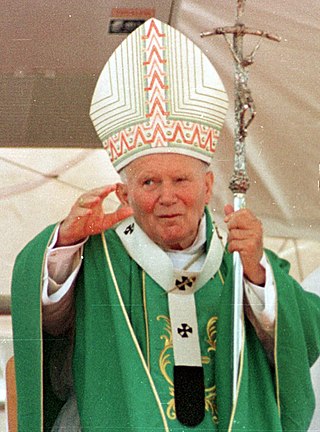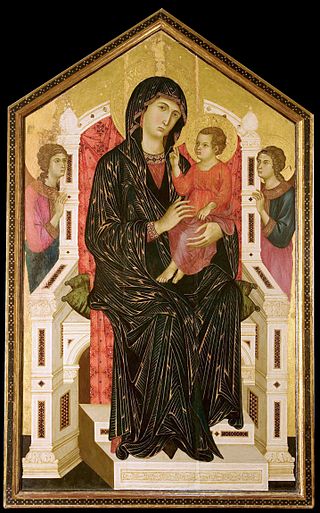
Humanae vitae is an encyclical written by Pope Paul VI and dated 25 July 1968. The text was issued at a Vatican press conference on 29 July. Subtitled On the Regulation of Birth, it re-affirmed the teaching of the Catholic Church regarding married love, responsible parenthood, and the rejection of artificial contraception. In formulating his teaching he explained why he did not accept the conclusions of the Pontifical Commission on Birth Control established by his predecessor, Pope John XXIII, a commission he himself had expanded.

Pope Paul VI was head of the Catholic Church and sovereign of the Vatican City State from 21 June 1963 to his death in August 1978. Succeeding John XXIII, he continued the Second Vatican Council, which he closed in 1965, implementing its numerous reforms. He fostered improved ecumenical relations with Eastern Orthodox and Protestant churches, which resulted in many historic meetings and agreements. In January 1964, he flew to Jordan, the first time a reigning pontiff had left Italy in more than a century.
The Latin phrase extra Ecclesiam nulla salus is a phrase referring to a Christian doctrine about who is to receive salvation.

Humanum genus is a papal encyclical promulgated on 20 April 1884 by Pope Leo XIII.

Catholic Mariology is Mariology in Catholic theology. According to the Immaculate Conception taught by the Catholic Church, she was conceived and born without sin, hence Mary is seen as having a singular dignity above the saints, receiving a higher level of veneration than all angelic spirits and blessed souls in heaven. Catholic Mariology thus studies not only her life but also the veneration of her in daily life, prayer, hymns, art, music, and architecture in modern and ancient Christianity throughout the ages.

The teachings of Pope John Paul II are contained in a number of documents. It has been said that these teachings will have a long-lasting influence on the Church.
Aggiornamento is an Italian word meaning "bringing up to date", "updating". It was made famous by pope John XXIII, and was one of the key words at the Second Vatican Council, used by both bishops and the media.
Mystici Corporis Christi(The Mystical Body of Christ) is an encyclical issued by Pope Pius XII on 29 June 1943 during World War II. Its main topic is the Catholic Church as the Mystical Body of Christ.
Ut unum sint is an encyclical by Pope John Paul II of 25 May 1995. It was one of 14 encyclicals issued by John Paul II. Cardinal Georges Cottier, Theologian emeritus of the Pontifical Household, was influential in drafting the encyclical.
Veritatis splendor is an encyclical by Pope John Paul II. It expresses the position of the Catholic Church regarding fundamentals of the Church's role in moral teaching. The encyclical is one of the most comprehensive and philosophical teachings of moral theology in the Catholic tradition. It was promulgated on 6 August 1993. Cardinal Georges Cottier was influential in drafting the encyclical, as was Servais-Théodore Pinckaers, a professor of moral theology at the University of Fribourg.
Redemptor hominis is the name of the first encyclical written by Pope John Paul II. It lays a blueprint for his pontificate in its exploration of contemporary human problems and especially their proposed solutions found in a deeper understanding of the human person. The encyclical was promulgated on 4 March 1979, less than five months after his installation as pope.
Redemptoris missio, subtitled On the permanent validity of the Church's missionary mandate, is an encyclical by Pope John Paul II published on 7 December 1990. The release coincided with the twenty-fifth anniversary of Vatican II's Decree on the Church's Missionary Activity, Ad gentes. It is devoted to the subject of "the urgency of missionary activity" and in it the pope wished "to invite the Church to renew her missionary commitment."

The theology of Pope Pius XII is reflected in his forty-one encyclicals, as well as speeches and nearly 1000 messages, during his almost 20-year pontificate. The encyclicals Mystici corporis and Mediator Dei advanced the understanding of membership and participation in the Catholic Church. The encyclical Divino afflante Spiritu began opening the door to historical-critical biblical studies. But his magisterium was far larger and is difficult to summarize. In numerous speeches Catholic teaching is related to various aspects of life, education, medicine, politics, war and peace, the life of saints, Mary, the mother of God, things eternal and temporal.

The history of Catholic Mariology traces theological developments and views regarding Mary from the early Church to the 21st century. Mariology is a mainly Catholic ecclesiological study within theology, which centers on the relation of Mary, the Mother of God, and the Church. Theologically, it not only deals with her life but with her veneration in life and prayer, in art, music, and architecture, from ancient Christianity to modern times.

The Mariology of the popes is the theological study of the influence that the popes have had on the development, formulation and transformation of the Roman Catholic Church's doctrines and devotions relating to the Blessed Virgin Mary.

Mariological papal documents have been a major force that has shaped Roman Catholic Mariology over the centuries. Mariology is developed by theologians on the basis not only of Scripture and Tradition but also of the sensus fidei of the faithful as a whole, "from the bishops to the last of the faithful", and papal documents have recorded those developments, defining Marian dogmas, spreading doctrines and encouraging devotions within the Catholic Church.
The theology on the body is a broad term for Catholic teachings on the human body.
Mother of the Church is a title given to Mary in the Catholic Church, as officially declared by Pope Paul VI in 1964. The title first appeared in the 4th century writings of Saint Ambrose of Milan, as rediscovered by Hugo Rahner. It was also used by Pope Benedict XIV in 1748 and then by Pope Leo XIII in 1885. Pope John Paul II placed it in the Catechism of the Catholic Church and Pope Francis inserted a feast by this title into the Roman Calendar.
Sister churches was a term used in 20th-century ecclesiology to describe ecumenical relations between the Roman Catholic Church and the Eastern Orthodox Churches, and more rarely and unofficially, between the Roman Catholic Church and the Anglican communion. The Catholic Church has since called on theologians to avoid the term, clarifying that "one cannot properly say that the Catholic Church is 'sister' of a particular Church or group of Churches. This is not merely a question of terminology, but above all of respecting a basic truth of the Catholic faith: that of the unicity [uniqueness] of the [Catholic Church]." The term is also currently used among Protestants to refer to different denominations of the same religious tradition.








